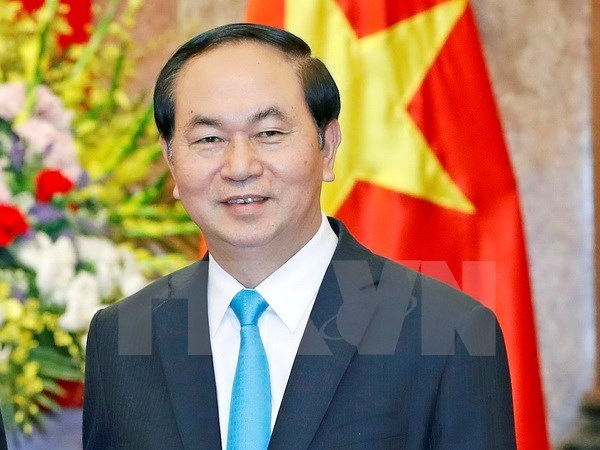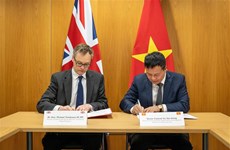Vietnam, China seek to improve cooperation efficiency
President Tran Dai Quang’s visit to China from May 11-15 is the first State-level visit of the Vietnamese President to China after the 12th National Congress of the Communist Party of Vietnam and the 14th National Assembly elected the new leadership of the Party and country.
 President Tran Dai Quang (Photo: VNA)
President Tran Dai Quang (Photo: VNA)The visit creates an opportunity for the two countries to further improve bilateral cooperation along the trend of development in 2016 and early 2017.
Vietnam and China have continued to exchange regular high-level visits and meetings since last year.
Notable were the visits to China by Party General Secretary Nguyen Phu Trong in January 2017 and Prime Minister Nguyen Xuan Phuc in September 2016. President Tran Dai Quang and China’s Party General Secretary and President Xi Jinping met at the APEC Summit in Peru in November 2016, while Prime Minister Nguyen Xuan Phuc met with Chinese Premier Li Keqiang at the 11th ASEM in Mongolia in July 2016. Also that year, Zhang Dejiang, Chairman of the Standing Committee of the Chinese National People’s Congress visited Vietnam in November.
Through those visits, the two sides agreed to respect each other, increase political trust and deepen win-win cooperation while well controlling and settling existing disputes and arising matters in order to promote the bilateral partnership in a healthy and stable manner.
Relations between the Vietnamese and Chinese Parties have been reinforced with the first ever meeting among representatives of the two Politburos held in October 2016 and the 12th theoretical workshop between the two Parties in December 2016, and cooperation in cadres training.
Both sides have coordinated to successfully implemented cooperation mechanisms such as the 10th meeting of the steering committee on bilateral cooperation in April 2017, the third border defence friendship exchange in March 2016, the sixth defence dialogue in November 2016, and the second deputy ministerial level security dialogue in September 2016.
Collaboration between ministries and departments has been promoted, especially in external affairs, defence and public security. The two sides held the first marine police conference in August 2016 and the deputy foreign ministers’ meeting in March 2017.
Localities have also enhanced people-to-people exchanges via various activities such as friendly meetings between Vietnamese and Chinese people, and the third Vietnam-China youth festival in November 2016.
According to Vietnamese statistics, two-way trade reached nearly 72 billion USD in 2016, a year-on-year rise of 7.9 percent, of which Vietnam’s exports accounted for nearly 22 billion USD worth of goods (up 28.4 percent) and imports about 50 billion USD (down 0.9 percent).
China continued to be the largest trade partner of Vietnam while Vietnam has become a major trade partner of China in ASEAN. Bilateral trade topped 19 billion USD in the first three months of 2017, a yearly increase of 27.5 percent.
As of March 2017, China had 1,615 investment projects worth 11.2 billion USD in Vietnam, ranking eighth out of the 116 countries and territories investing in Vietnam.
China also led in the number of tourists to Vietnam with 2.7 million in 2016 (a year-on-year rise of 51 percent), while Vietnam led in ASEAN in the volume of visitors to China with 2.2 million. Some 950,000 Chinese holidaymakers arrived in Vietnam in January-March this year.
The two countries maintained a stable situation along their border line on land and in the Gulf of Tonkin. They conducted the seventh meeting of the Vietnam-China Land Border Joint Committee in January 2017 and signed a Memorandum of Understanding on cooperation in breeding and protecting aquatic resources in the Gulf of Tonkin in January 2017.
Since the beginning of 2017, Vietnam and China have maintained exchanges on maritime issues and agreed to abide by common perceptions reached by their Party and State leaders and the agreement on the basic principles guiding the settlement of marine matters, as well as to effectively use governmental-level negotiation mechanisms on land border and sea-related issues.
They agreed to seek long-term solutions acceptable to both side to address maritime issues while implementing the Declaration on the Conduct of Parties in the East Sea, soon building the Code of Conduct in the East Sea, effectively controlling disputes at sea without actions to complicate and expand disputes, and maintaining peace and stability in the East Sea.
The presence of President Tran Dai Quang at the high-level forum on the Belt and Road Initiative in Beijing from May 14-15 aims to maintain the development momentum of the cooperation between the two countries’ Parties and States, increase political trust and bilateral cooperation efficiency in economics, trade and investment, and popularise Vietnam’s investment attraction policies for Chinese businesses.
His participation is also intended to reinforce common awareness of the two countries’ leaders about sustaining peace, stability and accelerating negotiations on maritime issues to promote regional and international integration, connectivity and cooperation.
On the occasion of President Quang’s upcoming visit to China, Chinese Ambassador to Vietnam Hong Xiaoyong wrote an article which was published by the newspaper “Nhan dan” (People).
The ambassador highlighted the “One Belt, One Road” initiative of China which has received response from and support of more than 100 nations and international organisations, while more than 40 countries and global organisations have signed cooperation deals with China.
Chinese businesses have poured some 50 billion USD into major projects in countries along the Belt and Road under the initiative, he noted.
Vietnam is an important nation in this initiative, he said, adding that along with the development of the bilateral comprehensive strategic cooperative partnership, both countries are holding discussion on connecting the initiative with the “Two Corridors, One Belt”.
The ambassador stressed that Vietnam and China are enjoying stable and mutually beneficial relations.
He noted that China attaches great importance to President Quang’s upcoming visit, which is expected to propel the cooperative partnership forward.
The President’s attendance at the high-level forum on the Belt and Road Initiative will further bilateral connectivity and create new vitality for cooperative relations, he added.-VNA













